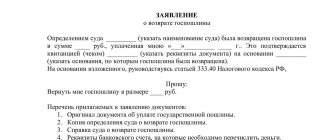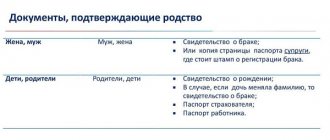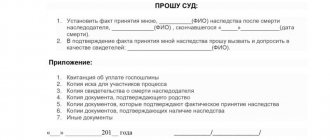In this article from the “Encyclopedia of Complex Cases in the Division of Property,” you can learn about the significance of the moment of termination of cohabitation and family relationships for the division of common property and how you can use this knowledge to your advantage.
So, paragraph 4 of Art. 38 of the Family Code of the Russian Federation provides that the court may recognize the property acquired by each of the spouses during the period of their separation upon termination of family relations as the property of each of them.
This rule is intended to regulate the situation when the spouses do not actually live together (have separated), but the marriage has not been dissolved and one of them (or both) acquires property. This happens often, because, as a rule, marriages are dissolved when it is impossible to continue living together and the primary thing for spouses is to separate. The state of a registered marriage is of less importance to them. I have come across cases where spouses did not divorce for several years and during this time managed to start new families and give birth to children. Here, as a lawyer, I can recommend that if it is impossible to continue family relationships and sufficient efforts have been made to improve family relationships, not to be lazy and dissolve the marriage, since otherwise this can lead to serious problems.
Clause 4 art. 38 of the Family Code of the Russian Federation provides for the following features.
Firstly, the court “may” (!) recognize the property as the property of each of them. This means that property may not be recognized as personal, but rather as shared. There could be many factors at play here.
For example, the duration of separation and the ability to accumulate a sufficient amount during this period to purchase property. It is quite obvious that, having separated, one of the spouses can spend, say, half of their monthly salary and buy a cell phone.
If he purchases a car worth an annual salary, we can assume that the car is purchased with jointly acquired funds. Although these may be borrowed funds, in this case he must confirm the fact of the loan.
Again, I repeat that there cannot be a single “recipe” here. Each case is individual and is also assessed individually by the court.
In general, according to my observations, the courts willingly apply this rule and recognize as personal property the property acquired by each of the spouses during the period of their separation upon termination of family relations, the property of each of them.
Secondly, the property must be acquired during the period of their separation upon termination of the family relationship. I have often seen the parties to a case refer to the termination of the “joint household”. So, friends, what matters is not the cessation of a “joint household”, but separation when family relationships are terminated.
To apply paragraph 4 of Art. 38 of the Family Code of the Russian Federation there must be both separation and termination of family relations.
Separation in itself does not entail recognition of property as personal property. For example, a spouse is on shift, on a long business trip, or lives in different cities for an objective reason (they need to develop “northern” experience,” etc.) and maintain family relationships. This is not a basis for applying paragraph 4 of Art. 38 of the Family Code of the Russian Federation.
I will express my personal opinion. In my opinion, the termination of family relations is sufficient to apply paragraph 4 of Art. 38 of the Family Code of the Russian Federation, because it is not always possible for spouses to live separately when they continue to live in an apartment as strangers, without maintaining contact with each other.
But this is my personal opinion. It is not known whether the court will support him in a particular case.
If you literally read paragraph 4 of Art. 38 of the Family Code of the Russian Federation, then simultaneous separation and termination of family relations are required.
The terms “separation” and “family relationships” are not provided for in the legislation.
Separate living certainly means living in different living quarters: in different apartments, different dorm rooms, different residential buildings.
Will living in different rooms of the same apartment be considered separate? On the one hand, sub. 3 p. 1 and p. 4 art. 16 of the Housing Code of the Russian Federation provides that a room is a residential premises and a room is recognized as a part of a residential building or apartment intended for use as a place of direct residence of citizens in a residential building or apartment.
On the other hand, an apartment is a residential premises and if spouses live in different rooms of the same apartment, then they live in the same residential premises.
What “family relationships” are is also not entirely clear. It appears that they include both the relationship between spouses and the relationship between spouses and children. In principle, if spouses live like cats and dogs, but raise children together, then the family relationship between them is preserved.
I repeat once again that law is not an exact science and in most cases the court can draw different conclusions from the same facts.
Typically, courts recognize property as personal property if the spouses have actually separated, live separately and do not conduct common affairs (do not maintain a common household).
Everything should be “simple” and “clear”
The family, as the basic unit of society, is characterized by the following - voluntary entry into a marriage union, common life, the desire to bear children and other signs aimed at the socialization and upbringing of children.
Therefore, registering a marriage with the civil registry office (registry office) is a necessary stage in creating a family union, after which its parties have corresponding rights and obligations, including in relation to each other (Article 10-15 of the RF IC) .
The termination of a marriage presupposes its dissolution - out of court (Article 19 of the RF IC) or in court (Article 21 of the IC), the procedure for which we will not touch upon.
Thus, having come to a balanced decision about the impossibility of saving the family, it is necessary to immediately dissolve the marriage and not put it off until later. Otherwise, after some time this may lead to a conflict caused by the protection of one’s rights.
How to establish the fact of termination of family relationships?
Lawyer Antonov A.P.
The fact of termination of family relations is established in court. For example, the actual termination of a marital relationship may be established when considering a claim for the division of common property between spouses.
1. Termination of family relations between spouses (marriage relations) The rights and obligations of spouses arise from the date of state registration of marriage in the civil registry office (clause 2 of article 10 of the RF IC). As a general rule, the termination of family relations between spouses means the dissolution of a marriage in the registry office or in court, as well as the recognition of a marriage as invalid by a court. In addition, the marriage is terminated due to the death or declaration by the court of one of the spouses as deceased (Articles 16, 18, paragraphs 1, 2, Article 27, paragraph 1, Article 30 of the RF IC; paragraph 13 of the Resolution of the Plenum of the Supreme Court RF dated 07/02/2009 N 14). Situations often arise when family relationships between spouses are actually terminated (for example, when spouses do not dissolve the marriage, but live separately and (or) have stopped running a joint household). Establishing the actual termination of family relations between spouses (the moment of their termination) may be necessary when resolving disputes about the division of property between spouses. Thus, the court may recognize the property acquired by each of the spouses during the period of their separation upon the actual termination of family relations as the property of each of them. The obligations that each of the spouses assumed during this period can be recognized as the obligations of each of the spouses (part 4 of article 38 of the RF IC; paragraph 16 of the Resolution of the Plenum of the Supreme Court of the Russian Federation of November 5, 1998 N 15; Appeal ruling of the Moscow City Court dated October 10, 2016 in case No. 33-37018/2016).
2. Termination of family relations between parents and children The origin of children, certified in the prescribed manner (state registration of the birth of a child through the preparation of a birth certificate), is the basis for the emergence of rights and obligations of parents and children (Article 47 of the RF IC; paragraphs. 1, 2, Article 3, paragraph 2, Article 6 of the Law of November 15, 1997 N 143-FZ; paragraph 1 of the Resolution of the Plenum of the Supreme Court of the Russian Federation of May 16, 2017 N 16). Parental rights are terminated, in particular, when children reach the age of 18 (the age of majority), as well as when minor children marry and emancipate. However, parents are obliged to support their disabled adult children who need help. In turn, able-bodied adult children, as a general rule, are obliged to support their disabled parents who need help and take care of them (clause 2 of Article 61, clause 1 of Article 85, clause 1 of Article 87 of the RF IC; clause 2 of Art. 21, Article 27 of the Civil Code of the Russian Federation). In case of deprivation of parental rights, the parent loses all rights based on the fact of relationship with the child in respect of whom he was deprived of parental rights, including the right to receive maintenance from him, as well as the right to benefits and state benefits established for citizens with children. At the same time, deprivation of parental rights does not relieve the parent (parent) from the obligation to support their minor child. Also, a child in respect of whom the parents (one of them) are deprived of parental rights retains the right of ownership of residential premises or the right to use residential premises, and also retains property rights based on the fact of kinship with parents and other relatives, including the right to receive inheritance (clauses 1, 3 of Article 60, clauses 1, 2, 4 of Article 71 of the RF IC; clauses 1, 2 of Article 31 of the RF LC; part 1 of Article 1142 of the Civil Code of the Russian Federation) . Waiver of parental rights and responsibilities is not provided for by law. Thus, as a general rule, establishing the fact of termination (actual termination) of family relations between parents and a minor child is impossible. In some situations, the question of terminating family relations between parents and adult children may arise, in particular, to recognize the child as having lost (ceased) the right to use residential premises. Thus, in the event of termination of family relations with the owner of a residential premises, the right to use this residential premises for a former family member of the owner of this residential premises is not retained, unless otherwise established by an agreement between the owner and the former member of his family. With regard to adult citizens, the legislation does not contain any restrictions on recognizing them as former family members of the owner of a residential premises, including their parent (Part 4 of Article 31 of the RF Housing Code; Appeal ruling of the Moscow City Court dated 02/12/2020 in case No. 33-6074 /2020). It should be noted that if a minor child is registered at the location of the residential premises owned by his parents, then before the child reaches the age of majority it is impossible to terminate his right to use the residential premises, even if the parents’ marriage is dissolved and the child begins to live with another parent who is not the owner of the housing (clause 2 of article 61 of the RF IC; clause 14 of the Resolution of the Plenum of the Supreme Court of the Russian Federation No. 14). Establishing the termination of family relationships may have legal significance when resolving the issue of fulfilling obligations under a social tenancy agreement (for example, to pay for utilities). Thus, if an adult child ceases to be a member of the family of the tenant of the residential premises under a social tenancy agreement, but continues to live in the occupied residential premises, he retains the same rights as the tenant and members of his family. In this case, an adult child is independently responsible for his obligations arising from the relevant social tenancy agreement (Part 4 of Article 69 of the RF Housing Code; Appeal ruling of the Moscow City Court dated January 16, 2020 in case No. 33-2345/2020).
3. The procedure for establishing the fact of termination of family relations The fact of termination (actual termination) of family relations is established in court.
3.1. The procedure for establishing the actual termination of family relations between spouses (marriage relations) The actual termination of family relations between spouses is established by the court when considering a dispute, in order to resolve which it is necessary to establish the existence of such a fact (in particular, a dispute about the division of property between spouses). In the statement of claim for the division of property between spouses, it is necessary to indicate, in particular, information about the actual termination of family relations (including the date of termination), evidence confirming the actual termination of family relations between spouses from the date specified by the plaintiff (clause 1 of Article 56, p. 5 Part 2 Article 131 Code of Civil Procedure of the Russian Federation). There is no requirement to submit a separate application to the court to establish the actual termination of family relations between spouses.
3.2. The procedure for establishing the termination of family relations between parents and children The termination of family relations between parents and adult children is established by the court when considering the relevant dispute, to resolve which it is necessary to establish the existence of such a fact (for example, a dispute about recognizing a former family member (an adult child) as having ceased the right to use residential premises ). The statement of claim for recognition of an adult child as having terminated the right to use residential premises must be accompanied, in particular, by documents confirming the termination of family relations. In the case under consideration, the child’s refusal to maintain a common household with the owner of the residential premises, the lack of a common budget and common household items with the owner, failure to provide mutual support to each other, etc., as well as leaving for another place of residence may indicate the termination of family relations with the owner of the residential premises, but must be assessed in conjunction with other evidence presented by the parties. The issue of recognizing a person as a former family member of the owner of a residential premises is decided by the court, taking into account the specific circumstances of each case (clause 1, article 56, clause 5, part 2, article 131 of the Code of Civil Procedure of the Russian Federation; clause 13 of the Resolution of the Plenum of the Supreme Court of the Russian Federation No. 14). It is not necessary to submit a separate application to the court to establish the fact of termination of family relations between a parent and a child.
Sincerely, lawyer Anatoly Antonov, managing partner of the law firm Antonov and Partners.
Still have questions for your lawyer?
Ask them right now here, or call us by phone in Moscow +7 (499) 288-34-32 or in Samara +7 (846) 212-99-71 (24 hours a day), or come to our office for a consultation (by pre-registration)!
Consequences of inaction
For some reason, the parties to the marriage are in no hurry to dissolve the marriage, they live in the same apartment or have dispersed to different regions, cities and countries, there is no time to deal with the dissolution of the marriage, and there is no need, because nothing binds the spouses.
However, no one thinks about the consequences of such actions, which may be intentional or unintentional.
In Art. Art. 34, 48 of the RF IC states that the common property of spouses can be property (movable and immovable), credit obligations and debts of one of the spouses, and the father of children born in marriage and within 300 days after its dissolution (invalidation, death of the spouse ) is recognized by the spouse.
In addition, one should not forget about the responsibilities of spouses (former) towards each other, which are set out in Chapter 14 of the RF IC.
Thus, it is not difficult to imagine the consequences of the inactions of persons who are in an official marriage, but do not take any action to terminate it.
The main points of dispute in such cases are:
- property division;
- debts (loans, mortgages);
- origin of children (challenging paternity);
- alimony obligations and their collection (in relation to each other, children);
- other.
The parties to such disputes may be:
- spouses in relation to each other;
- creditors in relation to spouses (Chapter 9 of the RF IC).
Accordingly, there is only one conclusion - inaction to end a marriage negatively affects the lives of the participants in the marriage relationship, but not immediately, but after some time, since the situations are different.
The difference between the moment of termination of the marriage and the date of actual termination of the marriage relationship
Thus, there is a big difference between the moment the marriage ends and the date the marriage relationship actually ends. When these dates coincide, the court divides the property on the date of the court's decision on divorce. If the dates do not coincide (a more common situation) - on the day of the actual termination of the marriage and family relationship.
Of course, the date of actual termination of the marriage relationship plays a key role if the division of jointly acquired property is planned. If this is not the case, it does not have a special role in dissolving the marriage.
The moment of termination of marital relations is the same for any court case on divorce, and it is determined strictly according to the rules specified by me in paragraph 1 of this article.
How to proceed
If the current situation already exists, then its resolution is resolved with the participation of a judicial authority.
Cases of this category are not simple from the point of view of proving the circumstances with which the disputing party substantiates its claims and objections (Article 56 of the Code of Civil Procedure of the Russian Federation).
In the case under consideration, the following circumstances must be proven:
- period of termination of actual relations;
- the nature of the relationship;
- presence/absence of cohabitation;
- running a joint household (separate or joint);
- other, depending on the situation.
Proof or refutation of these facts affects the court’s decision as a whole, and as a consequence, the material well-being of the parties.
Accordingly, some may lose property that was acquired with personal funds during the period of separation or are encumbered by debt obligations that also arose with one party during the period of separation.
The evidence used in each specific case is individual and can be written and/or oral, ranging from interrogation of witnesses to joint photographs and correspondence.
Grounds for divorce
The definition of grounds for divorce means the termination of family legal relations, which is carried out through judicial proceedings or a simplified procedure. The main thing is that among the exhaustive list of grounds for divorce established by the provisions of the RF IC, it is necessary to note the following grounds for termination of marriage:
- the presence of mutual consent to divorce among married persons;
- submission by one of the spouses of an application to the justice authorities, if the second spouse is recognized as missing, incompetent or guilty of committing a crime, the punishment for which is three or more years of imprisonment;
- submission by the guardian of an application to recognize the ward (who acts as a spouse) as incompetent.
For each presented basis for the termination of a marriage, there is a volume of features, the specificity of which allows us to speak of the termination of a marriage as a complex legal process.
The RF IC directly establishes cases in which divorce can be carried out according to a simplified procedure by the civil registry office. This requires mutual consent of the spouses and the absence of a dispute about children and property.
Any obstacle to divorce entails mandatory legal proceedings.
What's left
The outcome of all proceedings is unpredictable, the prospects for such family matters can only be assumed, but in order to avoid negative situations caused by the circumstances discussed in this article, we recommend ending the failed marriage in any legally available way and not delaying it.
Otherwise, the risk of adverse consequences that may result from inaction must be considered by each party to the marriage.
We remind you that the information provided is for informational purposes only and does not constitute legal advice or an opinion, since any application of the law requires careful and detailed study.
If the information provided raises additional questions, including about services in general, their list, volume and cost, comments on them can be obtained in the chat on the website, by phone +7 or email address [email protected] .
Termination of marriage from the point of view of the Family Code (RF IC)
Termination of marriage is the termination of legal relations between spouses arising from a marriage registered in accordance with the established procedure.
The legal regulation of the termination of marriage is enshrined in articles 16 to 26 of Chapter 4 of the Family Code.
According to Chapter 4 of the Family Code of the Russian Federation, marriage is terminated due to the occurrence of certain legal facts. This is the moment when the legal relationship between husband and wife is interrupted.
Ekaterina Guryanova, lawyer
The Family Code establishes that the termination of a marriage can occur not only as a result of divorce
Death or recognition of one of the spouses as deceased
The termination of a marriage is possible as a result of death. In this case, the date of termination of the marriage will be considered the day on which the second spouse died.
Positions si. 48 of the Civil Code of the Russian Federation provide a list of grounds, the presence of which allows one to recognize a spouse as deceased. These include:
- lack of information about the person’s place of residence at his place of residence for 5 years;
- absence of such information for 6 months, in the event that the person went missing under such circumstances that could threaten him with death. In addition, such circumstances may give reason to believe that the death of a person occurred as a result of an accident;
- disappearance of a serviceman or other person who was in a war zone, if after the end of the war he did not return to his previous place of residence within 2 years.
Consideration of this issue is entrusted to the justice authorities. The second spouse or other relatives of the presumably deceased person, as well as the prosecutor, have the right to petition for an appropriate decision.
Both death and the recognition of a person as deceased are an objective factor for terminating a marriage in a simplified manner, through the registry office.
Divorce at the request of one or both spouses
A simplified procedure for divorce by filing an application with the civil registry office is possible if there is mutual consent of the spouses and they do not have minor children. In this case, the existence of property disputes subject to consideration by the justice authorities does not matter.
In this case, the parties must submit a joint application to the marriage registration authorities expressing their desire for divorce. The absence of a mutual statement entails the need for a judicial procedure. Based on the joint application, after a month from the date of its filing, the marriage is dissolved, which requires the presence of at least one party.
The fact of divorce is reflected in the deed record, on the basis of which a certificate is issued.
This procedure for dissolving a marriage in which there are no minor children is the most civilized, less expensive in terms of time and money.
Grounds for ending a marriage in court
A marriage is subject to dissolution through the use of justice if the spouses have common minor children, or in the absence of the consent of one of the spouses to dissolve the marriage. An exception to this rule is cases when the second spouse is declared missing, incompetent, or deprived of liberty by a court sentence for a period of 3 or more years.
The grounds for ending a marriage are the breakdown of the family, which can be considered obvious and which is contrary to the interests of the married persons, their children and society. In this case, the consent of both spouses is not required. The court only establishes the fact that it is impossible to continue family relationships. For example, a party filing an application in court indicates dissimilarity in character as the reason. The court appoints a reconciliation procedure (at the discretion of the court, for a period of up to 3 months), after which the opinions of the parties are heard again and, even if one party does not want to continue the relationship, the marriage is subject to dissolution.
Along with making a decision on this issue, the court determines the order of residence of the minor, examines the issue of the property dispute and the financial support of the parties.
The moment of termination of marriage will be recognized as the entry into legal force of the decision. The right to enter into a new marriage for former spouses arises immediately from this date after receiving the appropriate certificate, which is issued by the registry office.







